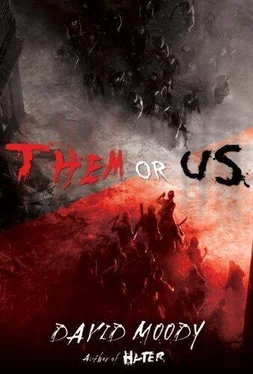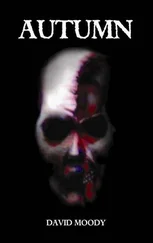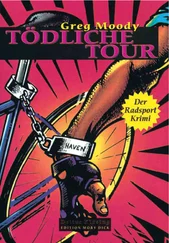5
RUFUS IS ON HIS pushbike, riding alongside me as I walk into town. Truth be told, I’m glad of the company, even though he never shuts up.
“Of course, I saw all this coming before the Hate.”
“All what coming?”
“This chaos. We’ve been on a slippery slope for years. We were overreliant on technology. There was an irony to that, wasn’t there? The easier it was for people to communicate, the worse at communicating they became.”
“I don’t have a clue what you’re talking about.”
“Did you ever try phoning a teenager’s cell?”
“Not that often, why?”
“I did. Fuckers would never answer. I worked with a lot of students, and they always had their phones in their hands, so how come they never answered?”
“You tell me,” I mumble, knowing full well that he’s about to.
“Either they were being selective and only talking to who they wanted to, or they were too busy using the phones for something else. All that social networking and stuff. Antisocial networking, I used to call it.”
“I wouldn’t know about that. We didn’t even have a computer at home. Couldn’t afford the Internet.”
He gives me a sideways glance, then continues. “People started using technology instead of thinking, letting machines do all the work, and now where are we?”
“Lowestoft,” I answer glibly.
“You know what I mean,” he says. “I knew this lad once, he had one of those SAT NAVs, remember them? Fucking thing stopped working when he was driving up for a meeting, and you know what happened?”
“He got lost?”
“Worse than that. Fucking idiot just kept driving in a straight line until he got a signal again. Didn’t think to look at road signs or get himself a map, did he? Took him almost fifty miles to get back on track. There was another time I had a girl in tears because she couldn’t unlock her car because the battery had gone and the key wouldn’t work. For Christ’s sake! I had to march her down to the parking lot and put the key in the fucking door for her myself!”
Rufus continues to chatter tirelessly as we approach the center of town. I say little. I know this is his therapy: his chance to vent his many frustrations without fear of taking a beating. Me, I’m too nervous to give a damn.
“The other day I saw that Curtis fellow, and do you know what he was doing? He was kicking in the door of one of the buildings next to the courthouse and using it for firewood. Where’s the sense in that when there’s so much they could use outside the compound? They’re just too blinkered. They don’t look any further than—”
“Rufus, shut up.”
I stop walking, and he stops pedalling. We’re deep among the underclass now, and something’s happening up ahead. I gesture for him to hold back and we wait by the side of a partially collapsed garage. There are other people all around us, most of them doing the same, keeping their distance. There’s a truck waiting at the barricade, just back from a scavenging mission by the looks of things, and it’s surrounded. One of the fighters in the front gets out and starts swinging a bludgeon at the people who are closest, forcing them back, but the crowd is large and volatile, and when he lunges for one section, people elsewhere surge forward. A couple of them manage to scramble up onto the back of the truck and help themselves, only to be kicked back down by another savage bastard hidden under the canopy. No sooner have they hit the ground than other vagrants are swarming around them, trying to “resteal” what they’ve just stolen. The situation deteriorates with frightening speed until two more fighters appear from the back and wade into the crowd. One of them brandishes a sub-machine gun that he fires into the air, and the people scatter. As soon as there’s sufficient space around the truck, the gate opens and it drives through.
“Lovely,” Rufus says. “I think this is where I’ll leave you.”
He pushes off and pedals away. I don’t know where he’s going, but I do know he has as little desire to head into Hinchcliffe’s compound as I do. At least he has a choice.
The closer I get to the gate around the compound, the more human detritus there is to wade through. This so-called society has divided itself into its own bizarre class structure. It’s like a pyramid now with Hinchcliffe perched alone at the top. Below him are his generals, Llewellyn and a couple of others—those fighters who first, understand how this new world order works, second, have enough brains to know how to deal with Hinchcliffe and keep on his good side, and third, are strong and ruthless enough to hold their own in any conflict. Beneath them are the rest of the fighters, their position in the overall scheme of things depending entirely on their individual strength and aggression, and beneath them are the Switchbacks: people who’ve desperately tried to regain something resembling their old lives, finding new routines and responsibilities to fill the void where now-defunct jobs, families, and relationships used to be. At the bottom of the heap are the hundreds of useless vagrants like the woman who broke into the house last night. Hinchcliffe has a simple way of evaluating each person’s worth: Does he need them? If they weren’t there, he asks, would it matter? With resources so limited, he’s not about to waste time and effort on those useless people who are only going to take. Those poor bastards are lost without a purpose.
As I pick my way through the crowds of underclass—some begging for food they know I won’t give them, some scavenging, some picking through a huge mountain of waste like a landfill site, some hunting rats that others have disturbed, many others just sitting and staring into space—I try to work out where I fit into the hierarchy today. I quickly come to the same conclusion I reach whenever I think about it: I don’t. Sometimes, I don’t know if I want to. Even before the war I felt out of step with everyone else. Now I struggle to believe we’re all part of the same species.
I reach the cordon and hammer on the gate with my fist.
“Who is it?” someone shouts.
“Danny McCoyne,” I answer back. “Hinchcliffe wants to see me.”
A narrow hatch is opened and a fighter stares out at me, checking I’m who I say I am. There’s never any delay when I mention the big man’s name. The hatch closes again; then the gate immediately starts to open, and I’m pulled through as soon as the gap’s wide enough. It’s slammed the moment I’m inside.
I head up what used to be Lowestoft’s main shopping street toward the courthouse building, where Hinchcliffe bases himself, avoiding the foul-smelling piles of rubbish that are steadily encroaching on either side of the narrowing road. The atmosphere is different on this side of the barriers. Here there are fewer people out in the open, and those I can see are moving with more purpose than those stuck on the wrong side of the blockade. Here the Switchbacks compete to stay in favor with the fighters. They remind me of the little birds that used to risk their lives to clean crocodiles’ razor-sharp teeth or the parasitic fish that lived off sharks. This is a more symbiotic relationship, though, because they all need each other. The fighters are a uniformly foul breed—a mix of the physically strong, the instinctively aggressive, and those who are both. They’re a deadly combination of hard, experienced bastards who look like they’ve been fighting all their lives, and younger vigilantes on the cusp of adulthood, always ready for battle. They float like pond scum on top of everyone else, relying on the subservient Switchbacks to fix their cars, fetch their food, and do most other menial tasks in return for water and scraps of food. It all feels precariously balanced.
Читать дальше












